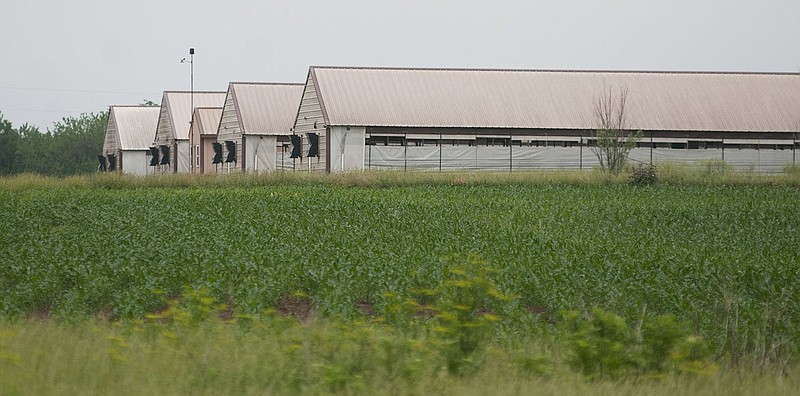Concerned citizens near a potential hog confinement site will have an opportunity to ask questions 7 p.m. June 10 in an open forum.
The Environmental Water Protection Program within the Missouri Department of Resources (DNR) sent a letter in May to residents living within 3,000 feet of the confinement area informing them that Eichelberger Farms, Inc., an Iowa-based company, planned to construct three buildings for a total capacity of 7,600 sows and 2,720 swine on Horstmeier Farms located off of State Road HH in Kingdom City.
According to the letter, a manure management plan in accordance with DNR will be in place. Pits underneath the building will hold waste that will be "land applied using an injected hose applicator system and will be incorporated within 24 hours of applications."
It also states annual manure pit samples will determine the nutrients that will be added.
Jeff Jones, who said he lives 3/10 of a mile from the site, is one of the worried neighbors looking for answers regarding odor and water pollution.
"That's a mighty large number of animals in my back door," Jones said.
He and others with concerns like Phillip Glenn, who said his residence sits between 2-3 miles away from the site, have compiled a list of 33 questions relating to facilities, infrastructure, waste management, disease control, deceased animal disposal and economics (tax rates and job creation).
Jones and Glenn said Eichelberger Farms, Inc. and The Pinnacle Group, an Iowa-based agronomic and environmental consulting firm representing Eichelberger, have been fairly unresponsive to questions, but a representative should be available at the June 10 meeting.
Some of those questions include:
•How many total animals, including baby pigs and gilts, will be in the facilities at any one time? What is the method of insemination and will boar hogs be on the premises?
•What is the management plan for air quality and smell control?
•Will new roads and bridges be required to access the facilities or will existing roads and bridges need to be modified/upgraded to handle traffic?
•How many gallons or tons of animal waste must be dispersed annually?
•How many gallons of water will be required annually to flush the pits? What will be the source of that water?
Of all the questions, Jones said he wants an answer to his biggest question: "why wouldn't they pick an area with a lesser population to build such a large-scale operation?"
"The fear of the unknown in a community stirs emotions," Jones said.
Someone who has been in communication with area residents is Darren Horstmeier, the son of the father-son duo running Horstmeier Farm, who said he's aware of the community's main concerns - odor and waste management.
"We don't want to harm the environment," Horstmeier said. "We don't want to harm anyone or anything."
Eichelberger Farms approached the Horstmeiers about using the land for hog confinement. After meeting with Eichelberger, Horstmeier said the deal was a "no brainer" as there were two big draws for his farm - the manure for fertilization use on his corn and soybean crops and the feeling that the Eichelbergers are "good folks," especially after a positive conversation with Don Nikodim with the Missouri Pork Association. According to Horstmeier, Eichelberger Farms is expected to bring about 25 jobs to the area.
"From the outside looking in, it looks like they (Eichelbergers) care about their product," Horstmeier said.
Horstmeier said he probably won't be the only farmer utilizing the manure as others have already contacted him about purchasing the waste.
"There's a positive point in the grain farmer's eye about the potential use of this," Horstmeier said.
Eichelberger Farms, which Horstmeier said already has two smaller operations in the Hatton area, was looking to pursue other options if Horstmeier didn't take them up on the offer, but the chance made sense for the lifelong farmer. With nowhere to expand his farm, Horstmeier said the manure will self-sustain the farm for fertilizer.
"When you can't expand you have to become as efficient as possible," Horstmeier said.
Currently, eight 700-head barns with the potential to hold 5,600 pigs are located on his property, but there are fewer than 2,000 pigs there now. Manure on his farm is knifed into the ground and he plans to do the same when Eichelberger moves in.
Horstmeier, who has farmed for most of his life, said concerns may stem from a lack of farming knowledge.
"If they don't farm as a livelihood, maybe they don't understand," Horstmeier said. "That's what the meeting is going to be Tuesday night."
He added that he hopes people leave the meeting Tuesday with facts, not assumptions. Jones anticipates a "positive and respectful" discussion.
"Hopefully everyone can unify and get together on something like this," Jones said.
The forum will take place 7 p.m. June 10 at the Hatton-McCredie Elementary School and is open to the public.

